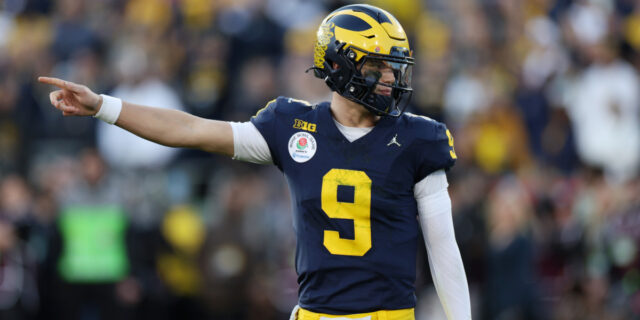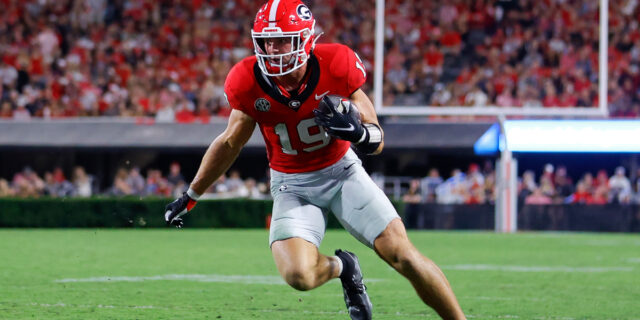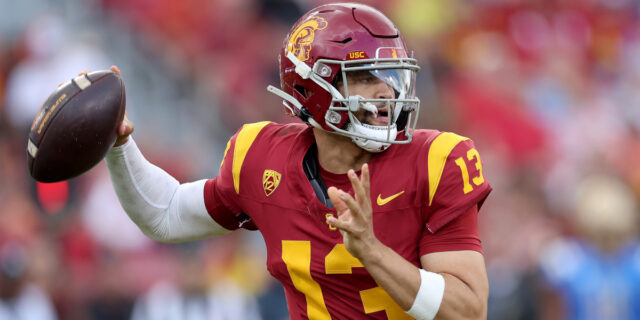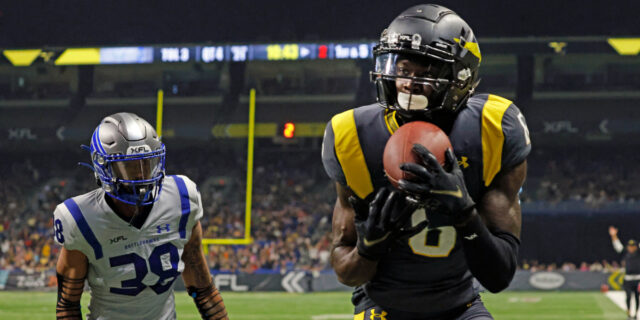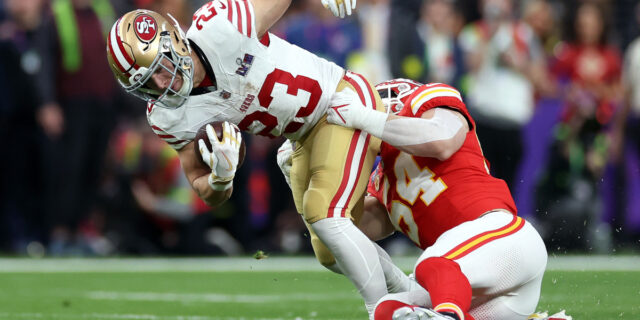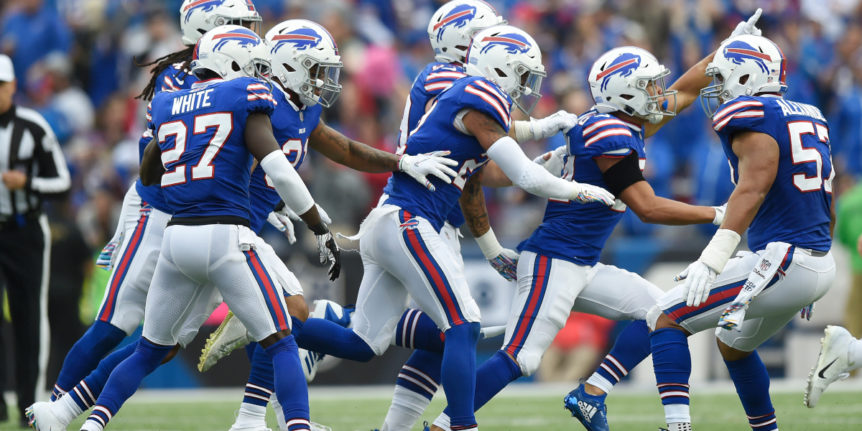
Bills Recharged?
This article originally appeared in Issue 11 of Gridiron Weekly – for individual editions or subscriptions, click HERE
As he discusses the defining moment of his Hall-of-Fame executive career, Bill Polian’s voice begins to crack. He has just detailed the Indianapolis Colts’ journey of frustration through the early 2000s, in which an exceptional team saw their path to pro football’s ultimate prize blocked by the New England Patriots, to the landmark 2006 AFC Championship Game victory over Bill Belichick’s men that preceded their Super Bowl XLI victory over the Chicago Bears.
For Polian, the latter represented the crowning achievement of a footballing life of frustration, built up over years watching the Buffalo Bills team he built reach four successive Super Bowls without lifting the Lombardi Trophy and compounded over his early years in Indianapolis. Yet the trigger for Polian’s emotions isn’t the victory, nor the pride he describes at seeing his hand-picked right-hand man Tony Dungy become the first black coach to win it all.
It comes from a moment in the days after finally getting his hands on that iconic silver trophy, when he arrived back at the team facility. “I’ll never forget it,” Polian tells Gridiron. “There was all this mail, and 75 of the letters and telegrams – 75 – were from Buffalo. It still gets me choked up to this day. Bills fans were saying, ‘Your Super Bowl is our Super Bowl’. That was special.”
“I was pretty honest with the public when I said we were 2-14 on merit, that it wasn’t a mirage and that there was a lot of work to do.”
Many NFL supporters are accustomed to heartbreak. From those who don masks in the Cleveland Browns’ ‘Dawg Pound’ to the Vikings supporters scarred by four unsuccessful brushes with the Super Bowl in the 1970s. Yet no football fan, perhaps fan in any sport, understands acute pain quite like a certain generation of the Bills Mafia.
Their scars are derived from following a team that might very well be one of the greatest in NFL history, but are remembered, unkindly, in hilarity. Despite the great names that made up the roster around the start of the 1990s, the Bills remain the only team to win four consecutive conference championships – something not even the all-conquering division rival New England Patriots have achieved – but also the only NFL team to lose four consecutive Super Bowls.
For all that Polian and Dungy formed a close partnership at the Colts, the GM’s time alongside veteran head man Marv Levy in Buffalo promised greater success, the talent evaluator and coach in lock-step as they built a championship contender from the ashes of an AFL champion and former NFL playoff team fallen on hard times. “There was no talent, but I knew what I was getting into,” Polian says of his arrival in New York State, “I was pretty honest with the public when I said we were 2-14 on merit, that it wasn’t a mirage and that there was a lot of work to do.”
As former director of pro personnel, Polian had already had a hand in rebuilding Buffalo’s roster although, at that time, he was not only competing with fellow NFL franchises, but also those in the upstart USFL. To that end, the Bills’ first-round draft selection in 1983 made it clear that he would rather venture into the unknown rather than the uncompetitive.
Jim Kelly, the stellar passer out of the University of Miami, was Buffalo’s pick at 14th overall, but opted instead to join the USFL’s Houston Gamblers where, having made known his dislike of cold conditions, the climate-controlled Astrodome was going to be more to his liking. He duly reset league records and snagged MVP honours in a 1984 season that saw him amass 5,219 passing yards passing and 44 touchdowns. Even when the Gamblers folded, Kelly immediately found a new home in New Jersey, signing with Donald Trump’s Generals. And then the USFL collapsed.
Although he had opted for the rival league, the Bills still held the rights to Kelly’s services, and Polian wasn’t prepared to see his target slip away a second time. “Jim reiterated immediately [that] he didn’t want to play in Buffalo,” the GM confirms, aware that the QB had the Los Angeles Raiders in his sights and would resist any attempt to drag him to the opposite end of the country. Even as Kelly threatened to force a trade, however, Polian countered with his vision for the future.
“Let me tell you what we’re constructing here, with you in mind,” he recalls telling the future Hall-of-Famer. “We have a great young receiver in Andre [Reed], who’s going to be an All-Pro. We have a great backup in Frank Reich, who’s already played a year. We have a tight end we just traded for in Pete Metzelaars, who’s going to be dynamite for you; and a pretty good offensive line. We’re rebuilding Buffalo and the object is to win the Super Bowl, not to be .500.”
The pitch clearly worked, and Kelly was soon lining up alongside not only Reed, Reich and Metzelaars, but also the 1984 first overall pick, defensive end Bruce Smith, halfback Thurman Thomas, linebacker Cornelius Bennett and an offensive line marshalled by brilliant centre Kent Hull, as well as the league’s best special-teams unit.
The remodelled Bills began to bear fruit in 1988 as Polian’s meticulously compiled roster was shaped into winners by Levy. The back-to-back 2-14 campaigns of 1984 and ‘85 were banished as the team went 12-4, winning the AFC East for the first time in eight years — and only the second time since the AFL, in which Buffalo claimed two crowns, merged with the NFL. Although that campaign faltered one step short of the Super Bowl, with defeat in Cincinnati, and the ensuing one ended with Bruce Matthews intercepting Kelly in the end zone to secure a 34-30 divisional round win for Cleveland, it wouldn’t be long before the Bills were going all the way.
The Browns defeat provided a turning point, not only in time but also in terms of how Polian, Levy and Kelly approached the game, permanently adopting the no-huddle offense that Cincinnati had pioneered. Despite being nicknamed ‘the Bickering Bills’ due to a series of internal conflicts, the new offensive scheme, with Kelly at the helm, again helped to land the AFC East crown, this time with a 13-3 record preceding a playoff run that cemented the K-Gun as the NFL’s most potent weapon. Dan Marino’s Dolphins fell in a 44-34 shootout, before the Raiders were frozen out 51-3 in the conference championship game, sending Buffalo to its first Super Bowl as firm favourites in a showpiece that would attract as much attention off the field as on.
“Those who don’t understand the magnitude of what we accomplished have never played sports or don’t understand the game.”
Six days after the start of Operation Desert Storm, and amid heightened security at an already tightly-monitored event, the Bills finally appeared poised to fulfil the goal laid out by Levy at his introduction to the Buffalo players in 1986. “Fellas,” he had announced to the locker room, “this is going to be a short meeting. Our objective here is to win the Super Bowl, not to play in it. But to win.”
The coach’s words unwittingly proved to be a contradiction in terms, as Super Bowl XXV became the first of four successive trips to the Big Dance that saw Buffalo leave, not as the belle of the ball, but Cinderella with both slippers still intact. That first visit was the closest the Bills came to winning, thwarted not only by Scott Norwood’s miss ‘wide right’ with eight seconds separating them from the Lombardi Trophy, but also the radical defensive gameplan imagined by then New York Giants’ defensive coordinator Bill Belichick.
“I thought it was a collective brain fart,” Giants linebacker Carl Banks said of the suggestion that Thurman Thomas be allowed to run for 100 yards. “Like, what the hell are you talking about?” The bigger picture, however, was to thwart Kelly’s passing game by smothering Reed and James Lofton, hitting them hard and denying the yards after catch numbers that epitomised the Buffalo system.
The Giants also limited Kelly’s effectiveness by dominating time of possession with a Super Bowl record 40mins 33secs on the ball, handing running back Ottis Anderson the MVP award and Jeff Hostetler the accolade of becoming the first backup QB to win the season finale as Big Blue survived 20-19.
The Bills weren’t the first to lose back-to-back Super Bowls — Minnesota and Denver had already done that — but were the first to do so with back-to-back 13-3 regular-season records under their belts. Another AFC East title, their fourth in a row, paved the way for playoff wins over the Chiefs and Broncos to set up a return to the showpiece, this time against Washington. While Kelly and Co continued to fire on offense, however, the Bills defense ranked second to last in the league in terms of yards allowed, and falling down 17–0 early in the second quarter proved to be a chasm from which not even the K-Gun could escape. Kelly was both sacked and intercepted on four occasions, while opposite number Mark Rypien was named MVP as he became the third different QB to bring head coach Joe Gibbs a Lombardi.
Things only got worse from there, with back-to-back defeats against the Dallas Cowboys taking the Bills to an unwanted four-from-four. An 11-5 record wasn’t even enough to maintain their run of divisional titles — the Miami Dolphins took the 1992 crown on a tie-breaker — but Buffalo battled back to the Super Bowl, only to find themselves on the end of a 52-17 shellacking after giving up a record nine turnovers and losing Kelly in the second quarter.
It was a little closer when the two sides met 12 months later, with the Cowboys coming out 30-13 winners after trailing 13-6 at the half, but, by then, the Bills were something of a laughing stock, the ultimate chokers unable to come good in the biggest of games. For all that, however, there were still highlights that underlined just how good the franchise had become, including Reich masterminding the biggest comeback in NFL history, from 32 points down to beat the Houston Oilers 41-38 in overtime. “It would have been very easy after being defeated in a Super Bowl to just lie there in the foetal position and whimper, but we fought back,” says Levy. “It’s a very difficult road you have to travel to get to the Super Bowl.”
That the Bills’ turnaround wasn’t rewarded with Super Bowl success is due, in part, to meeting a bunch of NFC East teams at the height of their own brilliance, either in terms of coaching or on-field ability, but Smith — who won Defensive Player of the Year honours in that first Super Bowl season — joins Levy in speaking positively of the time and their achievements. “Those who don’t understand the magnitude of what we accomplished have never played sports or don’t understand the game,” he claims. “Talk to former players and experts on the NFL, and they are amazed at what we accomplished.”
“You have to be able to have high level of execution of your fundamentals in key moments of the game, and we didn’t.”
Since those heady days in the early Nineties, Buffalo’s fortunes again fluctuated, with four further playoff appearances before the turn of the century launching them into a prolonged period of mediocrity that yielded only two winning seasons in 17. After two trips with Levy replacement Wade Phillips, Bills Mafia — recently voted the best fans in the NFL — suffered through barren years as Gregg Williams, Mike Mularkey, Dick Jauron, Perry Fewell, Chan Gailey, Doug Marrone and Rex Ryan cycled through the head coach’s office, unable to end the then longest playoff drought in league history. However, a change of ownership in 2014, following the death of founder Ralph Wilson, eventually led to new coaching blood being infused into the Bills, with erstwhile Eagles and Panthers defensive coordinator Sean McDermott becoming the franchise’s 22nd leading man.
The 43-year-old duly won his first game in charge — emulating only Levy and Ryan — and, having produced a winning campaign, returned the Bills to the postseason, albeit only to lose to a surging Jacksonville side in a dour encounter. The loss of key roster members prompted a missed opportunity the following year, but McDermott, having had chance to mould his own crew in conjunction with GM Brandon Beane, returned Buffalo to the playoffs for the second time in three years in 2019, although their 10-6 record meant nothing as they again fell at the wildcard round when victory over Houston had seemed likely.
Although the search for a playoff win now stretches over a quarter of a century, McDermott clearly has the Bills pointing in the right direction and, with players the calibre of Stefon Diggs, Josh Norman and assorted veteran linemen willingly moving north to join rising talents Josh Allen, Tre’Davious White, John Brown, Tremaine Edmunds and Devin Singletary, the franchise appears poised to be a contender for years to come, not least with the perennial roadblock Patriots apparently weakened for the first time in 20 years.
McDermott’s defensive leanings have restored Buffalo’s stingy reputation, while espousing the belief of ‘making the best of what you have’ to play to his rosters strengths. Allen, a somewhat controversial pick as the QB of the future, enjoyed a healthy bump in passer rating last season and continued to produce with his legs as well as his arm, contributing a league-best nine rushing touchdowns in 2019. While McDermott confirms his protégé made a lot of progress in year two, he also knows there are still things to build on.
“Josh has made a tremendous amount of progress,” McDermott said at his end-of-season press call. “Is there still work to do? Yes. He’d be the first to tell you that is the case. I think it all comes back to just Josh trying to do too much. That’s the next step for him, that awareness maturity, the understanding that ‘I don’t have to do it all myself’. And we have to continue to give him pieces that he trusts — in addition to the ones that he already had.”
Having taken Zack Moss with their second pick of the 2020 draft, the running back room now resembles a youth club, having seen the likes of Marshawn Lynch, LeSean McCoy and Frank Gore donning Bills blue in recent years, while the wide receiving corps blends experience and enthusiasm in close measure. The defense, however, will remain the strength of the franchise, even if it failed to live up to expectation in Houston in January.
“You have to be able to have high level of execution of your fundamentals in key moments of the game, and we didn’t,” admitted the coach, whose NFL career record currently stands at 25-23. “We’ve also got to score more points and that’s part of our offseason. My hope is that, in time, the pain [of the playoff loss] will turn into strength and that strength will turn into growth.”
Buffalo, for all its Super Bowl futility and years of middling mediocrity, is clearly a franchise on the rise and will start the 2020 campaign as many peoples’ favourite to take top spot in the AFC East. McDermott, for one, isn’t taking anything for granted, but you sense he sees a return for the ‘battling Bills’.
“We’ve got some thoughts on where we need to improve, and certainly continuity is important,” he concluded. “Not just from coach to player but coach to coach, player to player and so on, keeping this team as intact as possible. As I told the team after the [wild card] game, we’ll never stop fighting. That’s been my career to this point and I expect the Buffalo Bills to never stop fighting.”
This article originally appeared in Issue 11 of Gridiron Weekly – for individual editions or subscriptions, click HERE

